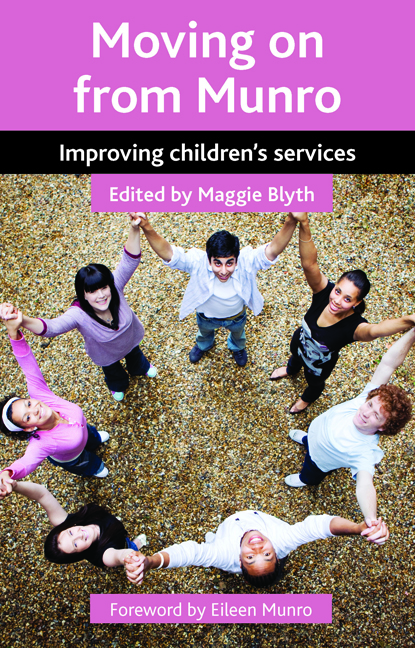Book contents
- Frontmatter
- Contents
- List of abbreviations
- Notes on contributors
- Acknowledgements
- Foreword
- Introduction
- 1 Getting the right things right
- 2 Child protection: 40 years of learning but where next?
- 3 Doing something different: reconfiguring front-line services: opening up the market
- 4 Re-imagining early help: looking forward, looking back
- 5 Children should be seen and heard: understanding the child’s experience
- 6 Responding to adolescent risk: continuing challenges
- 7 Moving on with Munro: child sexual exploitation within a child protection framework
- 8 Missing children post-Munro
- 9 Symbolic half-measures? On local safeguarding children boards, their contributions and challenges
- Conclusion
- Index
2 - Child protection: 40 years of learning but where next?
Published online by Cambridge University Press: 03 February 2022
- Frontmatter
- Contents
- List of abbreviations
- Notes on contributors
- Acknowledgements
- Foreword
- Introduction
- 1 Getting the right things right
- 2 Child protection: 40 years of learning but where next?
- 3 Doing something different: reconfiguring front-line services: opening up the market
- 4 Re-imagining early help: looking forward, looking back
- 5 Children should be seen and heard: understanding the child’s experience
- 6 Responding to adolescent risk: continuing challenges
- 7 Moving on with Munro: child sexual exploitation within a child protection framework
- 8 Missing children post-Munro
- 9 Symbolic half-measures? On local safeguarding children boards, their contributions and challenges
- Conclusion
- Index
Summary
The UK has had 40 years of learning about how to protect children from neglect and abuse. Based on the welfare state infrastructure built in the 1940s (Timmins, 1995), services, policies and practice have been developed incrementally to respond to and capture the learning. The consequence has been that when compared to other countries, the UK now has one of the lowest incidences of child deaths following the abuse and neglect of children, and this success has been stable and maintained for many years (Pritchard and Williams, 2009).
The journey over 40 years
It was 40 years ago in 1973 that there was a major public inquiry into the death of a seven-year-old girl from abuse (Department of Health and Social Security, 1974). Maria Colwell died in Brighton, having been neglected and abused in her family home and then violently assaulted by her stepfather. There had been other inquiries before, such as that into the death of Dennis O’Neill, a 14-year-old boy killed by his foster-father (Home Office, 1945), but what was new in 1973 was the media attention given to the Maria Colwell inquiry. In particular, anger about Maria's awful life and death was turned from the perpetrators of her neglect and abuse and directed at one of the professionals, Diana Lees, Maria's social worker, who sought to help families and to protect children. She was vilified in the press, described as ‘the defendant’ during the inquiry's proceedings, and harassed and threatened by a baying mob, who shouted at her during the hearings and chased her outside the inquiry, causing her to need police protection (Butler and Drakeford, 2011).
In addition to the Colwell inquiry being the first to attract such media attention, with hatred and harassment directed at the social worker, it was exceptional in that, alongside the majority inquiry report agreed by the barrister, doctor and councillor on the inquiry panel, a minority report was prepared by Olive Stevenson, the panel member who was a social worker. Stevenson died in 2013, 40 years after writing her minority report, and was a major contributor throughout her life to the improvement of child protection policy and practice.
- Type
- Chapter
- Information
- Moving on from MunroImproving Children's Services, pp. 27 - 56Publisher: Bristol University PressPrint publication year: 2014



